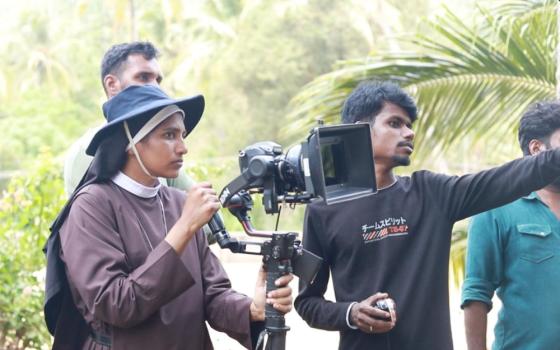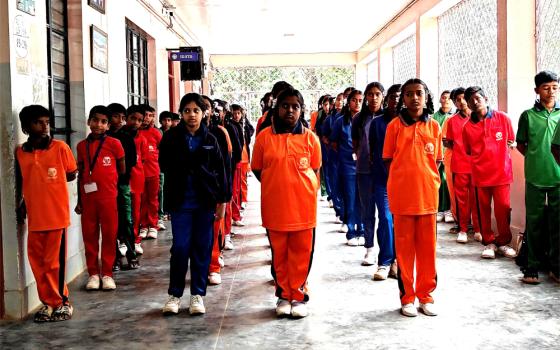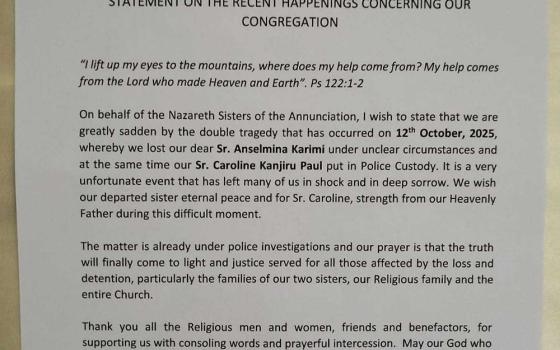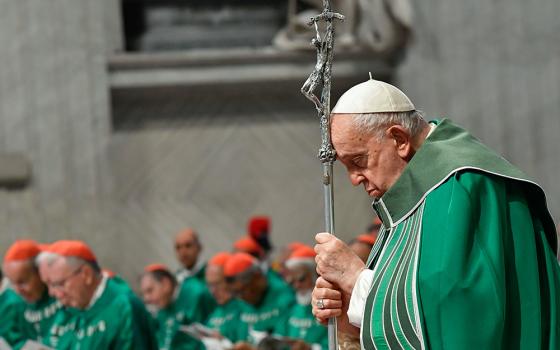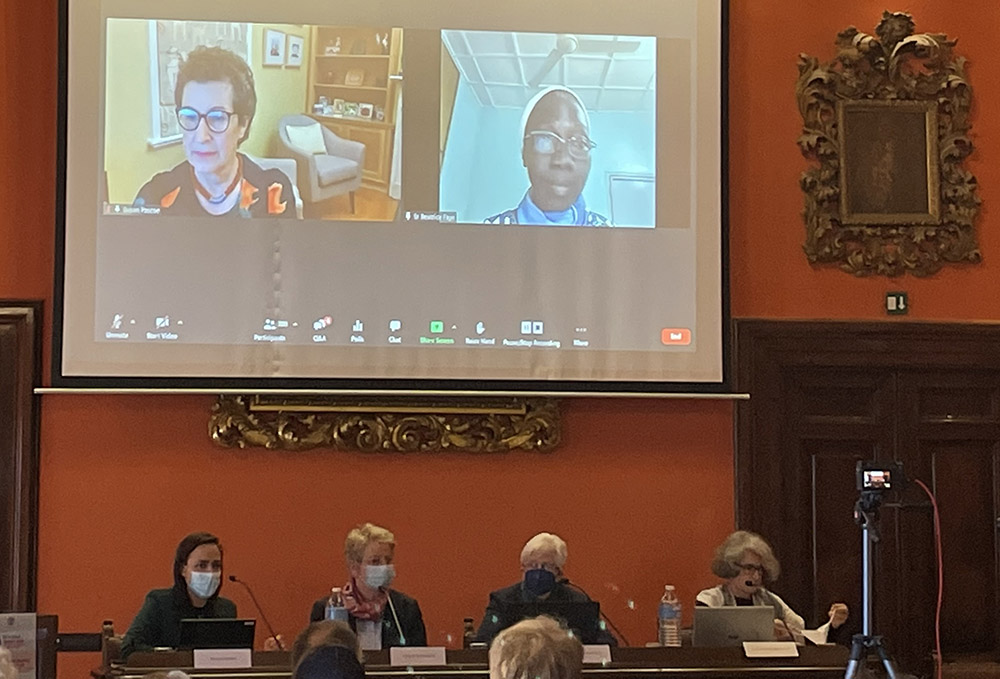
Panelists discuss how the process underway for the Synod of Bishops has to be sure to include the views of women and address "hot button" topics at a "Women in Synodality" event held in Rome on Dec. 16. From left: Australian Ambassador Chiara Porro; Myriam Wijlens, a professor of canon law at the University of Erfurt in Germany and a consultor to the Synod of Bishops; Sr. Pat Murray, executive secretary of the International Union of Superiors General; and Sr. Nathalie Becquart, undersecretary for the Vatican's office of the Synod of Bishops. Above on screen: Susan Pascoe, left, president of the Australian Council for International Development and Sr. Anna Béatrice Faye, a member of the African Research Group in Intercultural Philosophy. (GSR photo/Christopher White)
If the Vatican's global synod process is to succeed, discussion of hot-button topics such as women's ordination and women deacons cannot be silenced, according to the head of an umbrella organization representing some 600,000 religious sisters from around the world.
"We have to also allow the topics that people want to talk about to be named," said Loreto Sr. Patricia Murray on Dec. 16, specifically citing questions surrounding women in the priesthood and the diaconate.
Murray, who is executive secretary of the International Union of Superiors General, recalled that Pope Francis has previously authorized two commissions to study the issue of women deacons and said the two-year process for the Synod of Bishops on synodality, which was launched in October, must facilitate discussion on issues where some church leaders would rather avoid debate.
Her remarks came during a discussion on "Women in Synodality," co-hosted by Australian Ambassador to the Holy See Chiara Porro, the Jesuit-run journal La Civiltà Cattolica and Georgetown University.
While the traditional organizational structure of the Catholic Church is that of an all-male Catholic hierarchy, the two-hour conversation on Thursday aimed to amplify the voices of Catholic women from across the globe, with panelists from Africa, Australia and Europe.
In response to Murray's comments, Xavière Missionary Sr. Nathalie Becquart, who is undersecretary for the Vatican's office of the Synod of Bishops, said that the church "cannot be synodal" if it dictates in advance "how each topic will be addressed."
Instead, she said the process requires "deep listening" and "mutual listening."
Following the official launch of the synod in October, dioceses around the world are currently undergoing a "listening" stage, meant as a consultation with the entire church and even those outside of it.
While quoting Francis' mantra that the synod is not a "parliamentary process," Becquart said that the listening stage requires hearing the voices of everyone and the issues that are raised should be reflected in the summary document produced in the process.
Dutch theologian Myriam Wijlens, who is a professor of canon law at the University of Erfurt in Germany and a consultor to the Synod of Bishops, said that one of the fruits of the Second Vatican Council means that the church is not just "a top-down model anymore."
Advertisement
The synod, Wijlens said, involves all of the people of God, and women especially "can be protagonists" in the process that must welcome and include their beliefs and experiences.
She went on to lament the number of "highly academically trained women" in the church who choose to use their expertise elsewhere after feeling they are not heard by church leaders.
Becquart, who was appointed to her role in the synod office in February, said that when she joined she was the third woman on the synod staff and today there are now six. She also noted that there are now women on all of the synod's commissions, which she said is a "model that must be implemented all over the world."
Sr. Anna Béatrice Faye, a member of African Research Group in Intercultural Philosophy and who participated in the panel remotely from Senegal, echoed that sentiment, declaring, "Women are the driving force behind synodality."
Faye, a member of the Congregation of the Sisters of Our Lady of the Immaculate Conception of Castres, said that she believes that the experience of the two most recent synods have evidenced that women can make a "very positive" contribution to what was once a process limited to the church's male bishops and theologians.
Concretely, she went on to call for an examination of church law, saying that it would be necessary to "remove canonical obstacles that block the access of laypeople" from various positions of leadership in the church, such as the ability to serve as presidency of pastoral councils and other roles involving financial oversight of dioceses.
Susan Pascoe, who is president of the Australian Council for International Development, joined remotely from Melbourne and said that the synod cannot be an "echo chamber."
She went on to cite her work on the synod's methodology commission and said there has been a "tremendous focus on reaching out to people on the margins" of the church, which she said often have been women.
Listening and taking seriously the voices of women that have historically been ignored, all panelists repeatedly emphasized, is a prerequisite for the synod to succeed in its aims to listen to all of the church's members.
Murray noted that this must include listening to the hurt and abuses that have been felt "within the church, by the church."
She noted that this includes a range of abuses — the abuse of women religious, the abuse of minors and the abuse of exclusion — and said that "if we don't listen to the pain," the church will not understand individually or collectively how it is called to conversion.
"If we fail to do that," said Murray, "the synodal journey would seem to be incomplete."

